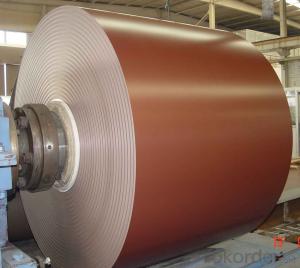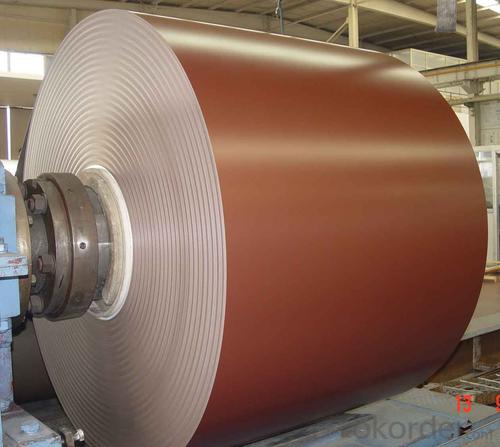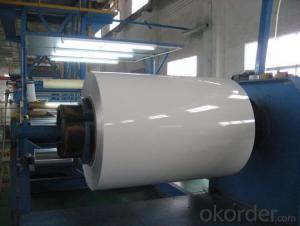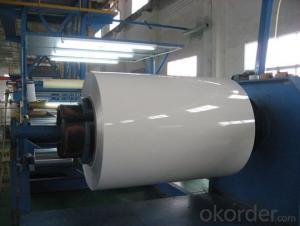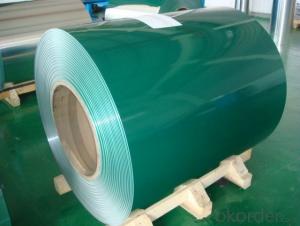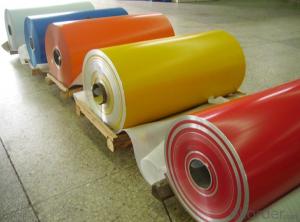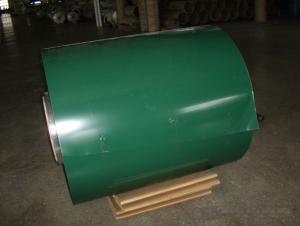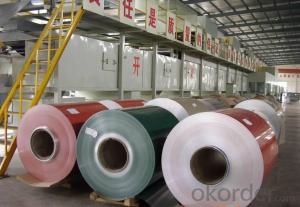Dark Bronze RAL 1034 PVDF 25 Micros Coated Aluminum Coil
- Loading Port:
- Shanghai
- Payment Terms:
- TT OR LC
- Min Order Qty:
- 5 m.t.
- Supply Capability:
- 50000 m.t./month
OKorder Service Pledge
OKorder Financial Service
You Might Also Like
Specification
Description
Product | RAL 1034 PVDF 25 Micros Coated Aluminium Coil | ||
Alloy | 1100, 1145, 1050, 1060, 1070, 3003, 3013, 3005, 3A21,4343,4045,etc. | Temper | H12.H14.H32.H34.H36. H38.O etc. |
Thickness | 0.2-7.0mm | Width | Until 2550 |
Painting items | PE and PVDF | Color | All Standards of RAL |
Coil weight | At clients’ requestments | MOQ | 5 tons |
Payment terms | 30% down payment 70% against B/L copy, L/C at sight | ||
Delivery time | 20-30 days after getting your down payment | ||
Package | Wooden Pallet (Customized packing ways are welcomed) | ||
Remarks | The special dimensions can be produced according to clients’ specification | ||
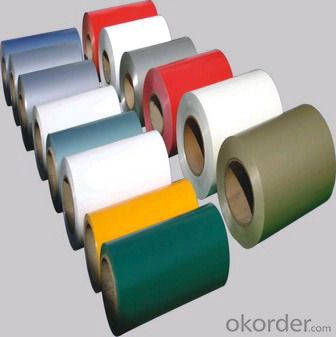
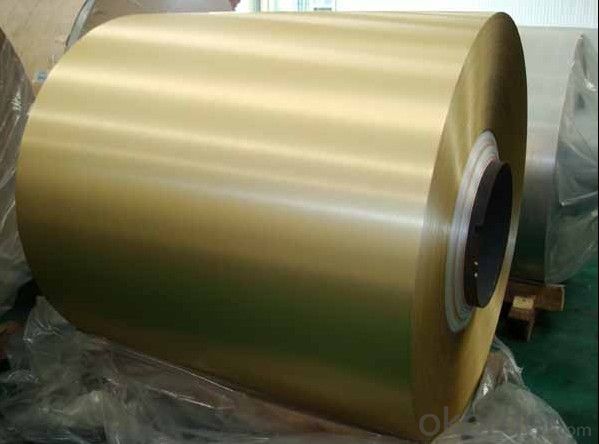
PE and PVDF Painting
Polyester Coatings (PE)
PE (polyester) coatings exhibit an excellent combination of hardness, flexibility, flow, appearance, and superior resistance to dirt retention in indoor and outdoor applications. These coatings are highly resistant to abrasion, metal marking, staining, and marring, and require minimal maintenance. Glazetech uses polyester paints which provide excellent colour and gloss retention properties.
Polyvinylidene Fluoride Coatings (PVDF)
PVDF (polyvinylidene fluoride) is a chemical resistant thick film barrier coating commonly used in architectural applications where both excellent appearance and substrate protection must be maintained over a long period of time. This coating is unaffected by most chemicals and solvents and has excellent wear and abrasion resistance. PVDF also has a high dielectric strength, excellent resistance to weathering and the ability to self extinguish.
- Q: is Aluminum wrotten with a 2 behnd it?
- Are you asking if it's a diatomic molecule? Because then the answer would be no. Aluminum is a metal. The only diatomic molecules are Hydrogen, Nitrogen, Oxygen, Chlorine, Flourine, Bromine and Iodine. And even those are only written when they are by themselve and not part of a chemical compound.
- Q: is there an anti-perspirant without aluminum in it for men? i saw there was a female question for it but i need a male one xD. something that you can find at your local wal-mart or such.
- addidas makes one ( only one of there kinds is aluminum free, you have to look at the labels carefully) ... it smells clean, man or women can use it. There is a brand called JASON as well that is all natural... thoes are the only 2 worth a darn. Ive tried others but they suck. Addidas is probably stronger if that is your concern. I have both in my bathroom right now, my husband and i both use them.
- Q: Can aluminum coils be used in high-pressure or high-temperature environments?
- High-pressure or high-temperature environments typically do not recommend the use of aluminum coils. Although aluminum is known for its high thermal conductivity and resistance to corrosion, it has limitations when exposed to extreme conditions. When it comes to high-pressure environments, aluminum coils may lack the necessary strength and durability required to withstand the forces exerted by pressurized systems. Aluminum has a lower tensile strength compared to metals like steel or titanium, making it more vulnerable to deformation or failure under high pressure. Therefore, it is generally advisable to use materials with higher strength and pressure ratings in such situations. Likewise, aluminum coils have a relatively low melting point compared to metals such as steel or copper. Aluminum's melting point is approximately 660 degrees Celsius (1220 degrees Fahrenheit), which makes it susceptible to damage or failure in high-temperature environments. For applications where the temperature exceeds the melting point of aluminum, it is recommended to use materials with higher temperature resistance. However, it is important to note that there are specialized alloys and coatings available that can enhance the high-temperature and high-pressure capabilities of aluminum. These modifications can improve its strength, heat resistance, and corrosion resistance, making it suitable for certain applications in extreme conditions. Nevertheless, it is crucial to carefully consider the specific requirements and limitations of the intended environment before deciding to use aluminum coils. Seeking advice from experts and considering alternative materials may be necessary to ensure the safety and efficiency of the system.
- Q: Are aluminum coils easy to install?
- Yes, aluminum coils are generally easy to install. They are lightweight and flexible, making them convenient to handle and position during installation. Additionally, they can be easily cut and shaped to fit the desired space, making the installation process relatively straightforward for experienced professionals or DIY enthusiasts.
- Q: wood aluminium windows?
- I would choose vinyl over aluminum, aluminum windows sweat in temp changes. We have installed vinyl windows in two different homes that we have lived in.
- Q: How do aluminum coils compare to copper coils in terms of performance?
- Aluminum coils and copper coils serve as two commonly used types of heat exchanger coils within heating, ventilation, and air conditioning (HVAC) systems. Although both materials effectively transfer heat, they differ in terms of performance. Due to its superior heat transfer properties, copper coils have long been the favored option for HVAC systems. Copper possesses excellent heat conductivity, enabling efficient thermal energy transfer. Consequently, copper coils effectively cool or heat the surrounding air, resulting in quicker and more efficient temperature control. Conversely, aluminum coils exhibit lower heat transfer efficiency compared to copper coils. Aluminum proves to be a poorer heat conductor, necessitating a larger surface area to achieve the same level of heat transfer as copper. Consequently, aluminum coils tend to be larger in size to compensate for their inferior heat transfer capabilities. However, aluminum coils possess certain advantages over copper coils. Firstly, aluminum boasts a lightweight nature, facilitating easier handling and installation. This proves particularly beneficial in situations where weight restrictions or handling limitations are present. Secondly, aluminum coils display greater resistance to corrosion in comparison to copper coils. Copper is susceptible to corrosion over time, especially in environments with high humidity or exposure to specific chemicals. In contrast, aluminum naturally forms a protective oxide layer, which aids in corrosion prevention. This results in longer-lasting coils and a reduced likelihood of refrigerant leaks. In conclusion, while copper coils offer superior heat transfer capabilities, aluminum coils possess their own benefits, such as lighter weight and enhanced corrosion resistance. Ultimately, the choice between aluminum and copper coils depends on the specific requirements of the HVAC system, including desired performance, budget, and environmental factors.
- Q: Its currently 3 AM so i can't check, but my question is:does aluminum rust slower/faster than other metals? I've basically had this bike for about 6 years, but only rid it once. Its been sitting in my backyard under a roof (safe from rain) for 6+ years. Is it safe to ride it? Also, bonus question: Does having a bike on campus make life 10x easier?
- Simple all alloy including aluminium turns to talcum powder which left will go black this is when the metal is oxidising. If the black is visible then scrap anything with it on. Have rescued many old bikes so things such as cables, tyres, tubes and your chain should be replaced as these usually suffer, if you are lucky these might still work. The chain will often freeze into a memory so won't turn, if not oiled may need hacksawed off. Most old bikes will reawaken with a few new or old replacement parts, also if will start to loosen with use so check it plus the bike will be desperately dry so to avoid component failure throw as much lubricant at it till it runs out and rejects it. The bike should only be sleeping so once wakened and sorted it will be as safe as you left it, though do check your brake blocks as these can split and perish. Steel parts can be replaced with alloy or treated with Kurust which gives rust a modern black component look. Have just woken a twenty five year old bike, once rebuilt it runs like a new bike plus is now safe as it has had various items modernised, something recommended for older bikes.
- Q: I need to make aluminum powder. What machine should I use and what aluminum object should I use?
- The okorder
- Q: How do aluminum coils contribute to noise reduction in buildings?
- Aluminum coils can contribute to noise reduction in buildings through their unique properties and installation techniques. Firstly, aluminum is a highly efficient sound insulator due to its density and ability to absorb and dampen sound waves. When used as coil insulation, aluminum can effectively block and reduce airborne noise transmission, minimizing the impact of external sounds on the building's interior. In addition to the inherent sound insulation properties of aluminum, the installation of aluminum coils in buildings can further enhance noise reduction. The coils can be strategically placed in areas where noise transmission is likely to occur, such as HVAC systems and ductwork. By tightly sealing these areas with aluminum coils, any potential gaps or openings that could allow sound to travel are eliminated. Moreover, aluminum coils can also act as a barrier to vibration and resonance noises. They can be installed around mechanical equipment or structural elements prone to vibration, effectively dampening these vibrations and preventing them from propagating throughout the building. This is particularly essential in reducing low-frequency noises, which are typically more challenging to control and can significantly impact the comfort and productivity of occupants. Furthermore, aluminum coils offer durability and longevity, ensuring their effectiveness in noise reduction over an extended period. They are resistant to corrosion, moisture, and other environmental factors, maintaining their sound-insulating properties and preventing sound leakage. Overall, by combining the sound insulation properties of aluminum with strategic installation techniques, such as sealing gaps and dampening vibrations, aluminum coils play a crucial role in reducing noise transmission in buildings. Their ability to absorb, block, and dampen sound waves makes them an effective solution for creating quieter and more comfortable indoor environments.
- Q: Can aluminum coils be used in chemical processing equipment?
- Yes, aluminum coils can be used in chemical processing equipment. Aluminum is known for its excellent corrosion resistance, making it suitable for use in many chemical environments. It is resistant to a wide range of acids, alkalis, and other corrosive substances. Additionally, aluminum coils are lightweight and have good heat transfer properties, making them ideal for applications where heat exchange is required. However, it is important to note that aluminum has limitations in certain aggressive chemical environments, such as strong acids like hydrochloric acid or sulfuric acid. In such cases, alternative materials like stainless steel or titanium may be more appropriate.
Send your message to us
Dark Bronze RAL 1034 PVDF 25 Micros Coated Aluminum Coil
- Loading Port:
- Shanghai
- Payment Terms:
- TT OR LC
- Min Order Qty:
- 5 m.t.
- Supply Capability:
- 50000 m.t./month
OKorder Service Pledge
OKorder Financial Service
Similar products
Hot products
Hot Searches
Related keywords
